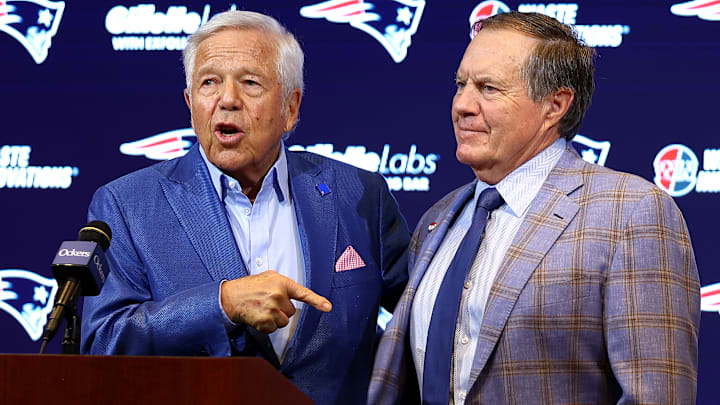There is no real surprise that 2024 went as it has for the Patriots. The whole new edifice was built on an illusion perpetrated by the Patriots' ownership. Their offseason actions (absent, seemingly insisting that they draft a top quarterback) predetermined this dreadful season, and it ranks among the worst in the history of this once-storied franchise.
Several key factors made this outcome almost inevitable. As Albert Breer has said, "... organization has systemic issues that go beyond the Head Coach need to be fixed". The ownership attempted to hoodwink Patriot Nation into thinking that real change was in the cards. It never happened absent brooming Bill Belichick. Scratch the surface, and it's painfully obvious.
Patriots owner Robert Kraft decided after the woeful 4-13, 2023 season to fire the architect of that debacle, who, after jettisoning Tom Brady, took the Patriots from bad to worse in a hurry. That decision to cut ties with Belichick after five post-Brady seasons was not senseless. (The choice here would have been to bring in a competent GM and allow the reputed all-time best head coach to retire with dignity. Whatever. Belichick was shown the door.)
At that point, Kraft had the opportunity to reshape the undeniably insular structure of Belichick's system and finally bring in new people with new ideas to reinvigorate a franchise that had lost its way. Unfortunately, he didn't, and that is the theme here.
The Patriots replaced a Hall of Fame coach with an untested pupil
The grand faux pas of Kraft’s 2024 phony-rebuild strategy was that there was no real rebuild at all. It was all a sham. Kraft had ostensibly and foolishly years ago committed to Jerod Mayo that he would succeed Bill Belichick. That was one of the kernels of the unraveling of the 2024 Patriots.
Mayo had never been a head coach at any level of football and hadn't even held a coordinator title. In addition, and this is central to the overarching argument here, not much could change at all. Mayo was lock, stock, and barrel, a coaching creation by and for Bill Belichick.
He’d played in the Belichick system for years, and his only coaching was under Belichick. The defensive coaching staff he hired was mainly populated by Belichick’s guys, primarily Demarcus Covington, the new defensive coordinator, and Steve Belichick.
On offense, he hired Offensive Coordinator, Alex Van Pelt, hardly an earth-shattering acquisition. The high school-level so-called Cleveland system he implemented flopped after the first game. On the coaching level, the more things supposedly changed, the more they had stayed the same.
Patriots' personnel operation remained Belichick's
Rather than breaking from the clearly flawed Belichick personnel model, Kraft again utilized his "They're nice young men” hiring strategy. He kept the old system and its people in place. "Meet the new boss, same as the old boss (almost)” strategy.
Kraft promoted or kept in place two of Belichick's top personnel guys, Eliot Wolf and Matt Groh. Their drafts had notoriously been littered with high and higher picks who not only weren’t key contributors; some couldn't play at all. So why keep the same structure and people in place and just kick the top man out the door?
The focus here is not on the current performance of the Executive vice president of Personnel, Wolf, and his staff—that's obvious for all to see. The issue is why the ownership kept Belichick's personnel operation almost completely intact and fired him. In retrospect, it made little (if any) sense at all.
The contrarian argument is that Belichick constrained the personnel department. So, did he just disregard their suggestions on the draft and free agency? Or did he just choose the wrong options? If that's the case, then the options were flawed to begin with. Belichick hired this team evidently with full confidence in their abilities. So, he's going to dismiss or disregard all of their suggestions? This strains credulity.
The gist of the matter is this, if the Patriots sought to make a clean break with Bill Belichick and his poor performances post-TB12, then why didn't they? Because clearly, they did not. It's a question only the owners can answer with certainty.
What all this adds up to is after firing Bill Belichick the Patriots proceeded to keep Bill very much in the building anyway. One might say they adopted "Belichickism ... without Belichick". As the Big O on WEEI used to say, "How'd that work out for them?" It's likely a 3-14 season, just like in 2023.
